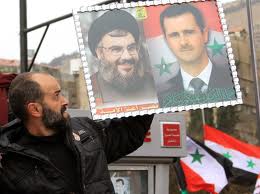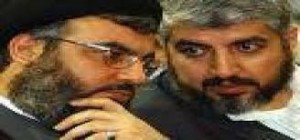 Hezbollah has been one of the staunchest supporters of the regime of President Bashar al-Assad, but now there are bitter arguments within its ranks about whether it is time to change course.
Hezbollah has been one of the staunchest supporters of the regime of President Bashar al-Assad, but now there are bitter arguments within its ranks about whether it is time to change course.
The giant banner with a portrait of Bashar al-Assad, strung across a busy street in South Beirut, proclaimed loyalty to the Syrian president — and cursed his enemies.
“Those who hate the Lion of Syria are sons of bitches,” it read, in Arabic slang with a play on the meaning of the Assad name.
Elsewhere in the Arab world he may be hated as a bloody tyrant, but in Hezbollah’s South Beirut stronghold Mr Assad is still a hero.
A couple of streets away, the British hostage Terry Waite was held captive for four years until his release in 1991, and nearby is the site of the notorious massacre of Sabra and Shatila where perhaps as many as 3500 people were murdered by pro-Israeli militias in 1982.
Hezbollah’s reclusive leader Hassan Nasrallah, the undisputed head of Lebanon’s Shia Muslims, lives nearby in a heavily guarded apartment complex. Hezbollah’s own police force, in khaki fatigues, patrol the streets, which are noticeably more crowded and scruffier than in the centre of Beirut with its nightclubs and fashionable shops.
Hezbollah – “the party of God” – needed help from neighbouring Syria to become the most powerful force in Lebanese politics, and it could always depend on the ruling family in Damascus during its wars with Israel.
Now in Mr Assad’s time of need Lebanon’s Shias have mostly been loyal in return – providing logistical and moral support and even sending fighters into Syria’s civil war to kill his enemies.
But in Lebanon there are as many Christians and Sunni Muslims as there are Shia. Now, as doubts grow that Mr Assad will survive and Syria’s civil war begins to spread into Lebanon, The Sunday Telegraph has been told of secret arguments raging inside Hezbollah’s ranks about whether the time has come to stop backing Mr Assad.
To many in South Beirut, where Hezbollah runs hospitals, schools, and rubbish collections, and pays pensions to the families of slain fighters, that would be unthinkable.
“Bashar is a major backer of our resistance, and so we are for him,” said Ahmad Suleiman, 43, a burly Hezbollah loyalist.
Mr Suleiman’s house was blasted into rubble in an air strike during the bloody 2006 war with Israel that Hezbollah claims to have won; in 1996 his brother was killed by an Israeli tank shell, making him “a martyr” he says proudly. He can remember “arrogant” Israeli soldiers patrolling his streets during the invasion of Lebanon, when he was a boy — streets that are still scarred with bullets from that time.
“The resistance”, as Hezbollah is called by its supporters, relied on Syrian and Iranian weapons and training to fight the Israelis. A bond was thus forged between Damascus, Tehran and South Beirut that until now has always looked unbreakable.
Many Hezbollah supporters insist it is Assad who is the victim, not the opposition, and that he is worthy of their support.
“In Syria there are terrorist attacks, torture, killing and beheading, all done by the enemies of the regime,” Mr Suleiman said. “This is not a revolution like the one in Egypt. Ninety per cent of the Syrians support Bashar. He is a good man and he will survive.
“If it looks as if he is in real danger, we will send thousands of our men into Syria. And if America or Nato is stupid enough to intervene, we will be there defending Arab lands.”
There were reports of fresh fighting in Syria on Saturday, with opposition activists claiming Syrian artillery bombarded cities, in breach of a truce meant to mark the Muslim Eid al-Adha holiday. Both the government and rebels agreed a truce. Mohammed Doumany, an activist from the Damascus suburb of Douma, said he had counted 15 explosions in an hour and said at least two civilians had been killed. There were also reports of heavy fighting along the Syria-Turkey border.
Hezbollah has a private army, regarded as a terrorist organisation by the United States, which is much stronger than Lebanon’s national army – yet it is also inside Lebanon’s government as part of an uneasy arrangement of rival political parties.
 Since it was founded in the 1980s it has built a reputation as a formidably disciplined organisation, tolerating no public dissent. But a year ago the rival Palestinian militant organisation Hamas, which controls Gaza, abandoned its support for Mr Assad. Now, insiders say, Hezbollah is engaged in a fierce debate behind closed doors over whether to follow suit.
Since it was founded in the 1980s it has built a reputation as a formidably disciplined organisation, tolerating no public dissent. But a year ago the rival Palestinian militant organisation Hamas, which controls Gaza, abandoned its support for Mr Assad. Now, insiders say, Hezbollah is engaged in a fierce debate behind closed doors over whether to follow suit.
“There are different points of view, with some saying that we should push for a settlement within Syria and not bank on Assad staying,” said one Lebanese with connections to senior Hezbollah circles.
Some Hezbollah members, including clerics, fear that their support for Mr Assad is dragging them into a dangerous fight with Sunni Arabs – the other side of Islam’s main sectarian divide – in Syria and Lebanon, he said.
They say it is now urgent to end their support for Mr Assad, so that a new relationship can be formed with whoever comes to power in Syria next.
“There is an awareness inside Iran and Hezbollah that they are going to have confrontation with the Sunnis, or are going to have to bridge the gap between them,” the source said. “The hardest topic is Syria. The future of Hezbollah and the Shia is directly related to the future of Syria. If Bashar is to be sacrificed, let’s sacrifice him and not Syria.”
The most dramatic sign of dissent within Hezbollah is the cancellation of a forthcoming party convention that is usually held every three years – the first time anybody can remember it being dropped. The official explanation is that it would be a security risk.
But a Shia politician from an important political family said: “They are not able to hold their convention because they are afraid they cannot agree on Syria.”
Disagreement is said to be strongest between civilian Hezbollah members, who are more likely to favour cutting links with Damascus, and its powerful military wing, trained and indoctrinated by Iran and still fiercely loyal to the Syrian regime.
“I have heard that the division is deep between the Lebanese branch of Hezbollah and the military. Hassan Nasrallah decided to cancel the convention,” said the source. “He was worried he would not be able to come up with a final resolution.”
Mr Nasrallah pledged his loyalty to the Damascus regime in public several times at the beginning of the crisis, but has shown much less enthusiasm about doing so recently.
“Nasrallah is anxious,” said one observer of the South Beirut political scene. “At every crossroads he watches closely what is happening.”
Car bombings and clashes between militias, alarming signs that Syria’s violent struggle is spreading to Lebanon, have forced many of his followers to wonder where their involvement with Mr Assad is leading them.
Dozens of Lebanese have died in fighting between pro- and anti-Assad factions in Lebanon’s cities this year, and the car bomb assassination nine days ago of the country’s spy chief, who was one of Syria’s biggest enemies in Beirut, brought back frightening memories of Lebanon’s own 15-year-long civil war.
Beyond Lebanon, Hezbollah’s prestige, once sky-high, now looks tarnished. Instead of being praised among Arabs for standing up to Israel, it is seen by many as the lackey of a bloodstained dictator.
When Hamas abandoned its support for Syria, under pressure from Palestinians appalled by the regime’s slaughter, Ismail Haniya, its leader in Gaza, dramatically announced it during Friday prayers in Cairo. “I salute the Syrian people who seek freedom, democracy and reform,” he said. There were calls of “No Hezbollah and no Iran” from the crowd.
For sticking with the Damascus regime, Hezbollah has been criticised by Saudi Arabia, Egypt, and the Gulf States.
Its support for the Assad regime was “an obvious strategic mistake”, said Abdel-Halim Qandil, the co-founder of the new left-of-centre Egyptian political party Kefaya (Enough). “It would have been better to be neutral or to keep silent,” he said.
There is growing unease even among Hezbollah’s grass-roots supporters in its political heartlands of South Beirut, and speculation that it will lose out politically as well.
“My mother has always voted for Hezbollah, but she has seen the television pictures of dead children in Syria and she is horrified,” said one Hezbollah supporter. “Of course she is behind the resistance. But for the first time in her life I think she may not vote for them in the next election.”
By: Nick Meo, Ruth Sherlock, and Carol Malouf in Beirut
Telegraph.co.uk.
Leave a Reply
You must be logged in to post a comment.